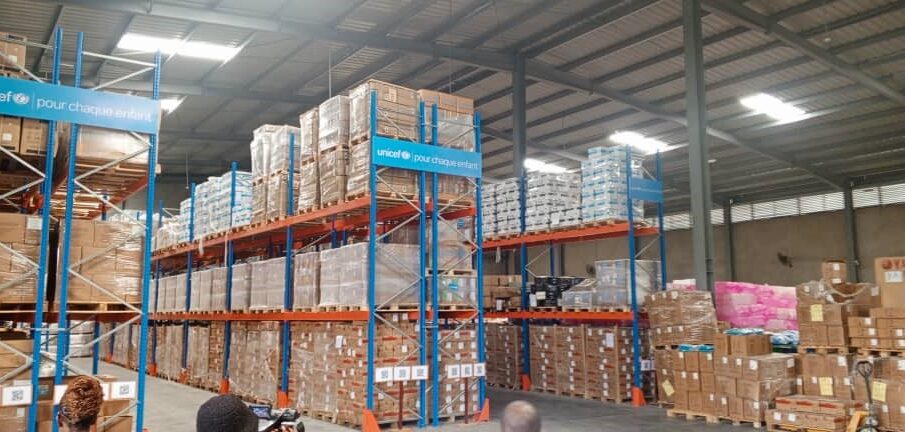Cameroon: UNICEF distributed around 6 billion Inputs last year

In this country, UNICEF has three warehouses, two in the north and one in Douala in the Littoral.
The United Nations Children’s Fund (UNICEF) concluded its working mission last Friday with a visit to its warehouse in Douala, the economic capital of Cameroon. With a capacity of 2250m2, the UNICEF warehouse store in Douala contains medicines, food, education support, all the inputs go into supporting children’s hygiene, that is to say: “buckets, cans, everything that is a vaccine carrier, cooler to support our vaccination campaigns with our partners”, informs us Ms. Roukayatou, warehouse manager.
Last year, UNICEF distributed about 6 billion inputs, we are told. “We have three warehouses in Cameroon, including one in Bertoua, another in Maroua and this one in Douala, our objective is to ensure the efficient distribution of all inputs in the national triangle,” recalls the manager of this warehouse. According to her, the UNICEF warehouse store in Douala also houses part of the contingency stock.
This warehouse is built according to international safety standards and the inputs are kept at the right temperature. However, UNICEF is well aware that some local health facilities still lack an adequate cold chain. “We are going to work on it and we have a program that allows us to meet these needs,” informs us Dr. Léornard Kouadio, from UNICEF.
Also read: Universal Health Coverage Phase I: Ebolowa, laboratory of reform
UNICEF plays a crucial role in immunizing children. It ensures the supply of vaccines. UNICEF is one of the largest purchasers of vaccines in the world, providing life-saving vaccines to nearly half of the world’s children each year; it is also involved in health systems strengthening, as UNICEF works to improve local health systems by investing in training health workers, strengthening supply chains and improving data systems. It is also active in community awareness and mobilization. “UNICEF runs awareness campaigns to inform communities about the importance of vaccination and combat misinformation. They work with governments, NGOs and other partners to mobilize populations,” explain the representatives of this organization in Cameroon.
It also provides emergency response. In the event of a humanitarian crisis or disease outbreak, UNICEF responds quickly to provide essential vaccines and health services to children in affected areas. In terms of specific initiatives, UNICEF launches targeted projects, such as the “No More Zero Dose” project, to reach unvaccinated children in hard-to-reach areas and conflict zones. “This project has helped to raise awareness of the importance of vaccination and reduce the number of zero-dose children, particularly in hard-to-reach areas,” says Fatimata Balandi of UNICEF in Cameroon. “Zero-dose” children are mainly found in geographically difficult areas, such as hills, islands, flooded areas, insecure areas, as well as refugee and nomadic settlements.
Ghislaine DEUDJUI














